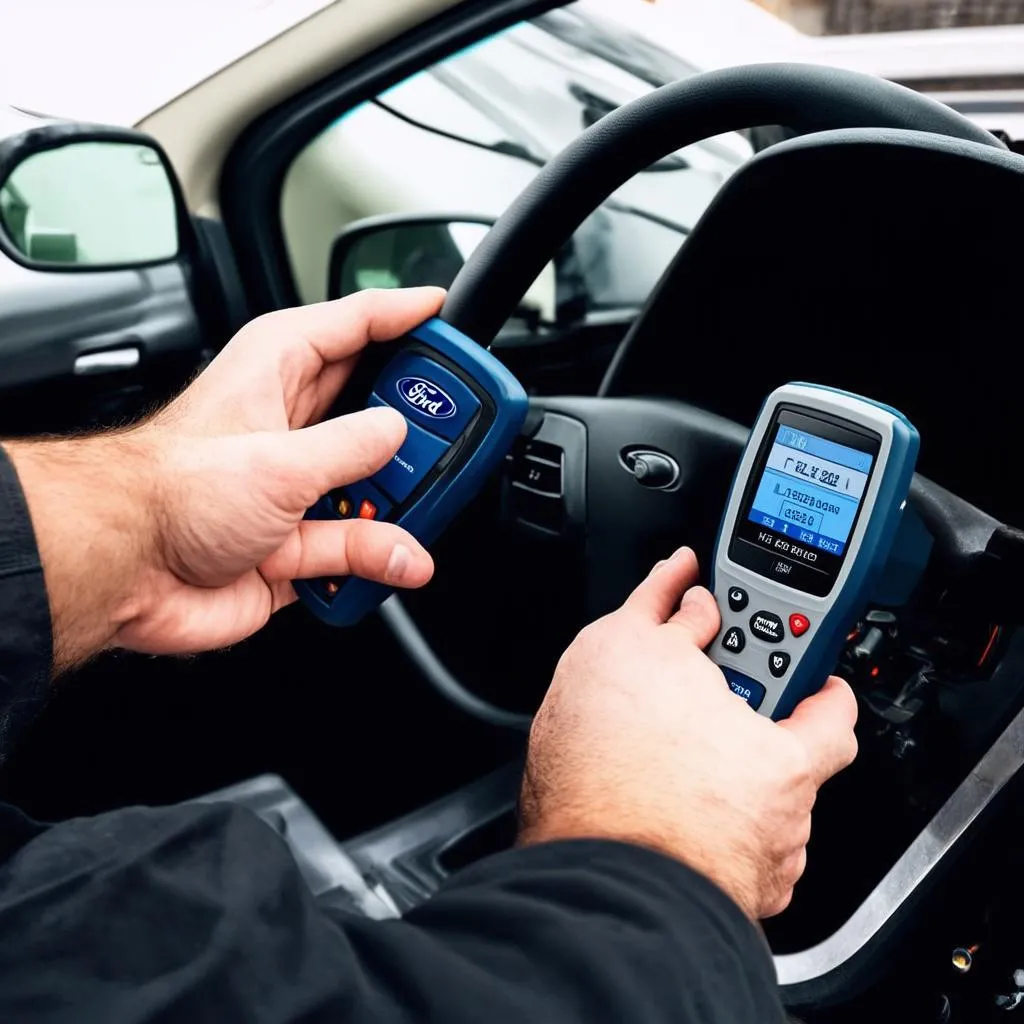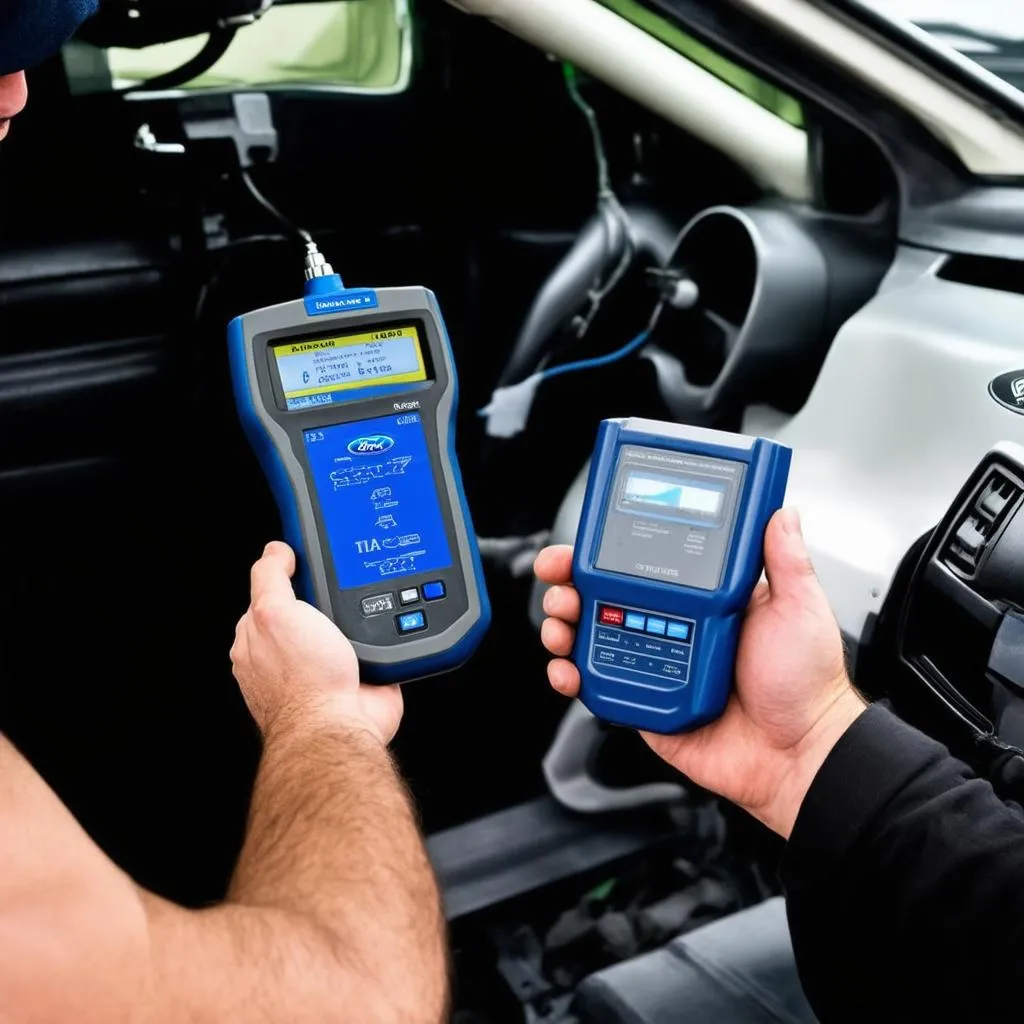“What’s the meaning of life?” pondered the young mechanic, staring at the flickering dashboard light. He wasn’t exactly a philosopher, but the flashing “check engine” light in a Ford Focus he was working on felt like a cryptic message from the universe. The truth was, it wasn’t a message from the cosmos, but from the car’s own “brain” – the On-Board Diagnostics (OBD) system. These codes, often referred to as “OBD error codes,” are a crucial part of understanding what’s going on under the hood of your Ford.
Understanding the Importance of Ford Obd Error Codes
OBD error codes are like cryptic messages from your car, providing insight into its health and potential issues. These codes are a valuable tool for both professional mechanics and car owners alike. From a mechanic’s perspective, they provide valuable diagnostic information, pinpointing specific problems within the car’s complex electronic systems. For car owners, knowing what these codes mean can empower you to understand the problem and potentially take action before a minor issue becomes a major headache.
Decoding Ford Obd Error Codes: The Key to Understanding Your Car
Think of OBD error codes as a language unique to your Ford. Each code corresponds to a specific component or system within the car. Understanding this language can be the difference between a quick fix and a costly repair. For instance, a code like “P0171” might indicate a problem with the fuel-air mixture, while “P0300” suggests a misfire in the engine. These codes can range from simple issues that require a quick fix to more complex problems requiring professional attention.
How to Read Ford Obd Error Codes: A Step-by-Step Guide
1. Accessing the Codes:
- OBD2 Scanner: An OBD2 scanner is an essential tool for accessing these codes. You can purchase a handheld scanner at most auto parts stores or use a smartphone app paired with a Bluetooth OBD2 adapter.
 obd2-scanner-for-fords
obd2-scanner-for-fords - Check Engine Light: The “check engine” light itself can sometimes provide a clue. Some Ford models have a blinking pattern that corresponds to specific codes. Refer to your owner’s manual for more details.
2. Understanding the Code Structure:
- P-codes: Codes starting with “P” are powertrain-related, covering issues like fuel systems, emissions, and engine performance.
- B-codes: These codes are related to the body control module, which manages features like power windows, door locks, and climate control.
- C-codes: Codes beginning with “C” pertain to the chassis, encompassing components like anti-lock brakes (ABS), traction control, and stability control.
- U-codes: These codes indicate a network communication error within the vehicle’s electronic systems.
3. Interpreting the Code:
- General Codes: General codes apply across multiple vehicle models and manufacturers. These codes are usually broad and offer a starting point for diagnosis.
- Specific Codes: Specific codes are unique to your Ford model and provide a more precise understanding of the problem.
Common Ford Obd Error Codes and Their Meaning
Here are some of the most frequent OBD error codes encountered in Ford vehicles, along with their possible causes and recommended solutions.
P0171 – System Too Lean (Bank 1)
This code indicates that the engine is running lean, meaning there is not enough fuel in the air-fuel mixture. This can be caused by various factors, including:
- Faulty Oxygen Sensor: This sensor measures the oxygen content in the exhaust and helps the engine control unit (ECU) adjust the fuel-air mixture.
- Air Leak: A leak in the intake manifold or vacuum lines can allow unmetered air to enter the engine.
- Clogged Fuel Injectors: Dirty or faulty fuel injectors can prevent the proper amount of fuel from entering the combustion chamber.
- Fuel Pressure Regulator Issue: A faulty fuel pressure regulator can affect the fuel pressure, leading to a lean condition.
P0300 – Random/Multiple Cylinder Misfire Detected
This code indicates that the engine is experiencing misfires, which can be caused by several factors, including:
- Spark Plugs: Worn-out or fouled spark plugs can cause misfires.
- Ignition Coils: A faulty ignition coil can prevent the spark plugs from firing properly.
- Fuel Injectors: Clogged or faulty fuel injectors can disrupt the fuel delivery, leading to misfires.
- Compression Issues: Low engine compression can lead to misfires.
P0420 – Catalyst System Efficiency Below Threshold (Bank 1)
This code indicates that the catalytic converter is not functioning properly, causing excessive emissions. This issue can arise due to:
- Clogged Catalytic Converter: A buildup of contaminants within the catalytic converter can restrict exhaust flow.
- Oxygen Sensor Failure: A faulty oxygen sensor can provide inaccurate information to the ECU, leading to problems with the catalytic converter.
- Fuel System Issues: A rich fuel mixture or a misfire can damage the catalytic converter.
Common Ford Obd Error Codes: A Deeper Dive
## P0174 – System Too Lean (Bank 2)
This code is similar to P0171 but pertains to Bank 2 of the engine, which is the opposite side from Bank 1. The causes and solutions are generally the same, but you should focus on components and systems specific to that bank.
## P0301 – Cylinder 1 Misfire Detected
This code pinpoints a misfire in cylinder number one. This code indicates a potential issue with the ignition system or fuel delivery system for that specific cylinder.
## P0455 – Evaporative Emission System Leak Detected
This code relates to a leak in the evaporative emission system, which captures fuel vapors from the gas tank to prevent them from escaping into the atmosphere. A leak in this system can be caused by various factors, including:
- Loose Gas Cap: A loose or damaged gas cap is a common cause of this code.
- Cracked or Damaged Fuel Lines: Cracks or holes in the fuel lines can allow fuel vapors to escape.
- Faulty EVAP Purge Valve: This valve controls the flow of fuel vapors to the engine for combustion. A faulty valve can lead to a leak.
What to Do When You Encounter Ford Obd Error Codes
- Don’t Panic: While a “check engine” light can be alarming, it doesn’t always indicate a major problem.
- Read the Code: Use an OBD2 scanner to read the code and gain insight into the potential issue.
- Consult your Owner’s Manual: Your owner’s manual may offer additional guidance on common error codes and potential solutions.
- Consult a Mechanic: If you’re unable to diagnose or repair the problem yourself, consult a qualified mechanic.
- Address the Problem Promptly: Ignoring an OBD error code can lead to more serious issues and potential damage to your car.
Where to Go for Help
If you’re encountering Ford Obd Error Codes and need expert assistance, TechCarUSA is here to help. Our team of qualified mechanics has years of experience diagnosing and repairing Ford vehicles. We offer comprehensive diagnostics and repair services, utilizing the latest tools and technologies. We can help you understand your car’s language and ensure its continued smooth operation.
 ford-obd-scanner-diagnostics
ford-obd-scanner-diagnostics
The Hidden Language of Your Ford
Like the whispers of ancient wisdom or the subtle movements of celestial bodies, your Ford’s OBD error codes hold a unique language, offering clues to its health and potential needs. Learning to interpret these codes can empower you to understand your car better and to take proactive steps towards its well-being. Remember, every car, like every human being, has its own unique story to tell. Through understanding, we can build a deeper connection with our vehicles and navigate the road with confidence.
Do you have any questions about Ford OBD error codes? Feel free to ask!
You might also find these articles helpful:
- How to Fix the “Check Engine” Light
- OBD Scanner Buying Guide
- Understanding OBD Protocols
- Fiat OBD Compatibility
For personalized support and expert advice, contact us on WhatsApp: +84767531508
We’re here to help you keep your Ford running smoothly!